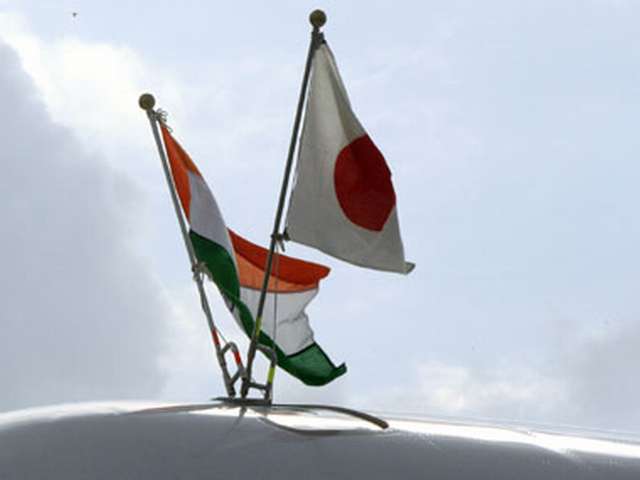Japan and India agreed on Monday to strengthen defense ties as Asia’s second and third biggest economies keep a wary eye on a rising China, with India’s PM Narendra Modi lashing out at the "expansionism" of some nations.
 Japan and India agreed on Monday to strengthen defense ties as Asia's second and third biggest economies keep a wary eye on a rising China, with India's Prime Minister Narendra Modi lashing out at the "expansionism" of some nations.
Japan and India agreed on Monday to strengthen defense ties as Asia's second and third biggest economies keep a wary eye on a rising China, with India's Prime Minister Narendra Modi lashing out at the "expansionism" of some nations.
Japanese Prime Minister Shinzo Abe and his Indian counterpart Narendra Modi also agreed to speed up talks on a so-far elusive deal on nuclear energy cooperation, welcoming what they called "significant progress" in the negotiations.
"From this day on, Prime Minister Modi and I will work hand-in-hand to dramatically strengthen relations in every field and elevate ties to a special, strategic global partnership," Abe told a joint media event after a summit with Modi.
They also agreed to accelerate talks on the possible sale of an amphibious aircraft to India's navy - likely to become Japan's first overseas military sale in nearly 50 years and a result of Abe's more muscular approach to defense in the face of an assertive China.
Modi, on his first major foreign visit since a landslide election win in May, arrived on Saturday for a five-day trip aimed at capitalizing on his personal affinity with Abe to bolster security and business ties.
"We intend to give a new thrust and direction to our defense cooperation, including collaboration in defense technology and equipment, given our shared interest in peace and stability and maritime security," Modi said.
In a sign of their warmth, the two leaders greeted each other with a bear hug when they met on Saturday in Japan's ancient capital of Kyoto for an informal dinner. Modi is one of three people that Abe follows on Twitter, while the Indian leader admires Abe's brand of nationalist politics.
"The 21st century belongs to Asia ... but how the 21st century will be depends on how strong and progressive India-Japan ties are," Modi told Japanese and Indian business executives earlier in the day.
Modi criticized the 18th-century expansionist ways of some countries that encroach upon the seas and territories of others, in a veiled reference to China, with which India shares a long disputed border.
Sino-Japanese ties have also been chilled by a row over disputed isles, feuds over the wartime past, and mutual mistrust over defense policies as China seeks a bigger regional role and Abe loosens the constraints of Japan's post-war pacificism.
Abe is keen to expand Japan's network of security partnerships with countries such as India and Australia to cope with the challenge presented by China.
Modi, for his part, is embarking on an intense month of diplomacy in which he will receive Chinese President Xi Jinping before meeting U.S. President Barack Obama in Washington as he seeks to carve out a stronger role for India as a global player.